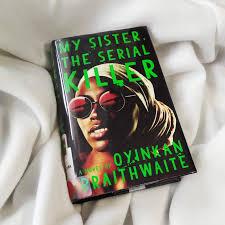Title: My Sister, the Serial Killer
Playwright: Oyinkan Braithwaite
Publisher: Knopf Doubleday Publishing Group
Price: £12.99 (paperback)
Number of Pages: 226
ISBN: 978-0-38554-424-5
Publication Date: 2018
Reviewer: Nekha Fathima Sulficar
Taking a break from the familiar conception of trauma, guilt, and saviour syndrome intertwined with family drama, triangle love story, and abusive patriarchal culture, Oyinkan Braithwaite makes a turn in Nigerian fiction through her debut novel, My Sister, the Serial Killer. Straight away from the title, the novel adopts a dark; yet, engaging plot with a thoroughgoing cultural understanding of perspicuous familial relations. Interestingly, the language and character settings add a humorous tone to this light read dark comic. With its deadpan narration, plot twists, and episodic chapter division, the author adopts intelligent ways to involve the reader throughout the novel.
“Korede, I killed him.” The wisecracking narrative begins with an alarming call from Korede’s sister, Ayoola, urging Korede to hunt for her tools to cover up her sister’s usual crime. As usual, she had a foolproof plan in her mind. Killing Femi; Ayoola’s latest boyfriend, was not her first; Ayoola had killed twice before, and Korede, a thirty-year-old nurse, protected her sister twice. Braithwaite’s narration is compelling with a description of humorous; yet, useful tips to cover-up the murder. Even though patriarchy holds its clutches, the story’s unique perceptiveness never makes the lady serial killer a monster.
There are no complaints; the charisma of imagination took the better hold – the debauched setting of Lagos. Even the cuckolding aspect is placed that it becomes a commentary of the place. Braithwaite is careful in bringing out the nature of Lagos, the traffic jams, the corrupt cops, the traditional Nigerian food, and dress, of a patriarchal and hypocritical society.

Nigerian culture is alluded to subtly, with the womanizing chief, marriage being deals and agreement. Cuckolding, she carefully sets her story that it becomes a commentary of the place she hails. The cuckolded setting of Lagos in Nigeria goes in line with the storyline; it further sets the plot where money and beauty hold more power in the Nigerian society. There are trauma and guilt played in-depth, but the protective nature of a bigger sister gets in the way. Braithwaite deftly characterizes Ayoola as a cheerful, irresponsible young woman, who cannot take care of herself; she is continually searching for attention and worldly pleasure. She possesses the attitude of a sociopath. While Korede being the polar opposite creates the perfect balance. Korode is shocked by her sister’s manner and attitude, but her saviour instinct gets in the way. It is essential to see that Korode, Ayoola, and their mother are victims of their father’s cruelty; he goes to such an extent that he makes a deal out of Ayoola’s attractiveness. Korode loves her sister so much; yet, she is jealous of Ayoola’s beauty. There are mixed feelings. The protective impulse, which is deeply placed, soon gets the best of Korode. Even though we see Korode as a rule adhering to a truthful person, her weakness is the impulse to protect her sister for her to bend the rules. She covers the murders; she lies, she steals everything for her sister. The relationship is well settled.
The book is well-structured, with each chapter limited to two or less than two pages. The short, titled sections meshing together are coherent without deviation. The simple chapter titles reflect upon the casual language used. The writer, however, does not forget to comment on the social structure and patriarchal ideals. Oyinkan plays with the idea of beauty when Korode finds Tad to be quite mannered, and understanding Ayoola says he’s no different, “everyone wants a pretty face. She even proves it. Even Ayoola loves her sister, but only after herself.”
The treatment of women characters in the novel is powerful; it is unique as it shows the full potential of women with agency. Be it Korode, Ayoola, or their Aunt. It is the power of women that is fully showcased through the storyline. Even in such a patriarchal society, when women get their full agency, they are unstoppable and powerful. The death of the father is still a mystery, and the possession of the knife by Ayoola is a symbol of attaining the power and agency that she long craved for. Similarly, Adichie’s seminal work Americanah shows a powerful lady with her agency, the medium and ends are different. Yet, the storyline is best suited to show the full strength of the subjugated femininity.
The shortcoming of the novel appears towards the ending of the novel. Even though the ending is abrupt, and resolution is never adequately brought out. The generational transmission of abusive behaviour is also felt. The finish is quite steep. The helpless human nature is portrayed as the fallibility, and the rule-bending for our loved ones is played well. Korode realizes that she is “a fool who has been taken advantage of.” As narrated by the author, when their father canes, Ayoola, Korode holds her loss so that the pain is distributed, and she never suffers alone. The author never justifies the murders. She just points us toward the direction of family and blood.
Overall, the work is a unique masterpiece if one wants to explore the power of language. Don’t let the blood put you off. The twisty and swirling nature of the novel is an apt reading for the present condition.
Nekha Fathima Sulficar is a Research Scholar in the Department of Humanities and Social Sciences at the Indian Institute of Technology Ropar. She has a BA Honours degree in English Language and Literature from the University of Kerala. She did her MA in English Literature from the University of Hyderabad. She is currently working on Memory and Trauma in African American Literature for her doctoral research.

